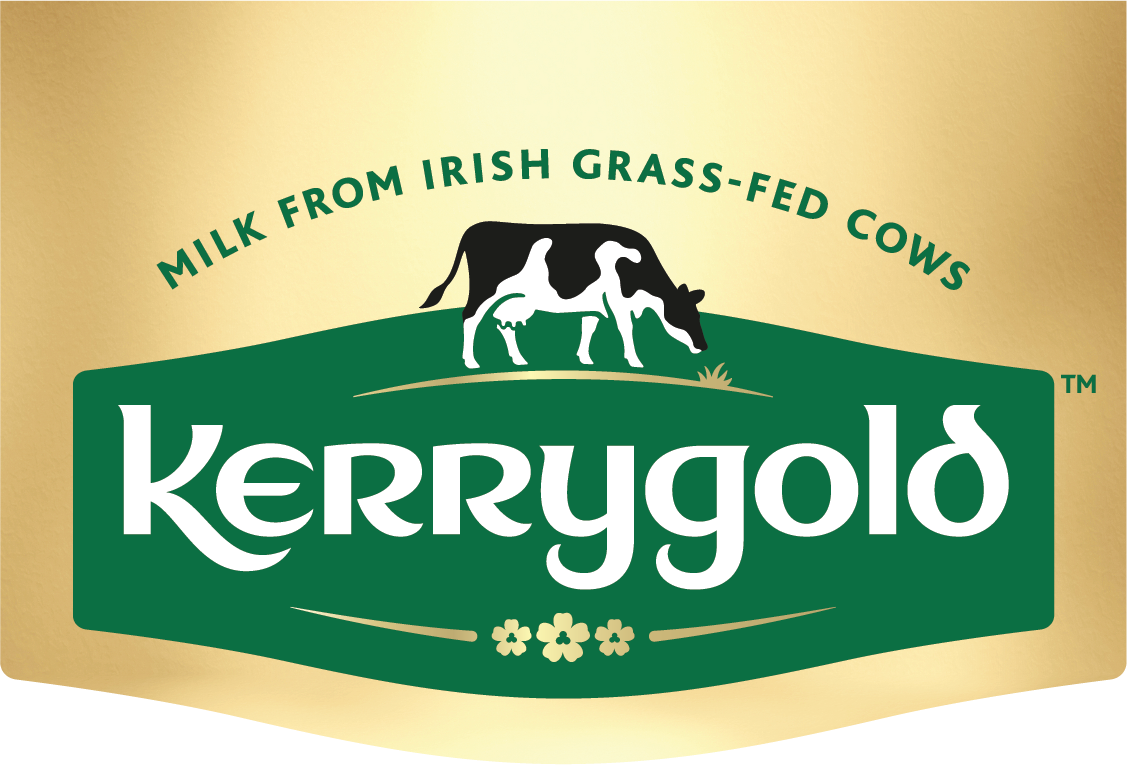All dairy suppliers for Kerrygold products sold in the US are certified to Ireland’s “Grass Fed Dairy Standard”. This ensures the milk we use is sourced from selected herds of cows that enjoy a diet of on average 95% grass or grass forage on a fresh weight basis. Outdoor grazing on grass plays an important part in the Grass Fed Dairy Standard. For more information on Ireland’s Grass Fed Dairy Standard, please visit www.bordbia.ie/farmers-growers/prices-markets/agri-market-insights/grass-fed-dairy-standard.
Kerrygold® butter and cheese are made from both A1 and A2 milk.
Kerrygold® Salted Pure Irish Butter has a butterfat content of 80% and Kerrygold® Unsalted Pure Irish Butter has a butterfat content of 82%.
Milk from cows that are grass-fed is rich in natural beta-carotene. This gives Kerrygold® butter and cheese their traditional rich golden color.
Currently, only Kerrygold® butter tubs are recyclable. You should be able to find the recycling markings on the bottom of the tub.
The maturation period for Kerrygold® cheeses are as follows:
- “Dubliner” cheese: Typically 9-12 months
- Reserve Cheddar: Typically 24 months
- Aged Cheddar: Typically 12 months
- “Skellig” cheese: Typically 18 months
- “Blarney Castle” cheese: Typically 90 days
- Reduced Fat “Dubliner” cheese: Typically 12 months
- Swiss: Typically 6 months
Kerrygold® Unsalted Pure Irish Butter has a butterfat content of 82%, while Kerrygold® Salted Pure Irish Butter has a butterfat content of 80%. The rest is water, salt and non-fat milk solids (mineral, proteins).
We don’t recommend leaving Kerrygold® butter or cheese out of the refrigerator for longer than four hours at average room temperature.
Typically, Kerrygold® butter stays fresh up to 18 months in the freezer and 1 month chilled after opening.
We do not recommend freezing Kerrygold® cheese, as it can have a negative effect on the texture and flavor.
Typically, Kerrygold® Pure Irish Butter stays fresh up to 18 months in the freezer and 1 month chilled after opening. Kerrygold® cheeses should be refrigerated and stored in an airtight container once opened and consumed within 2-3 days of opening.
Do not consume Kerrygold® products after the best before date. If you purchased a Kerrygold® product that was out of date at the time of purchase, please return to the store where you purchased it and they will happily exchange it.
Kerrygold® butter and cheese do not contain any gluten material, nor trace elements of gluten, with the exception of Kerrygold® “Dubliner” cheese with Irish Stout. This is made with real Irish stout, which contains gluten.
However, if you are following a gluten-free diet, we advise that you consult with a health care professional before consuming any new food, including Kerrygold® products.
All Kerrygold® cheeses are made using microbial rennet, and therefore are suitable for vegetarians. Kerrygold® butter is suitable for vegetarians.
Kerrygold® products are not made with nuts and are not processed in an environment where nuts are processed.
Kerrygold® butters, excluding Kerrygold® Garlic and Herb butter, are kosher. However, all Kerrygold® cheeses are NOT kosher. We do not currently include the Kosher logo on our packaging.
In Ireland, the majority of dairy cows are Holstein Friesian cows.
Irish dairy farms have traditionally small herd sizes, on average just 79 cows.
The use of artificial growth hormones, like rBST, is prohibited in Ireland in accordance with European legislation.
The fields Irish cows graze on can be treated with approved pesticides and herbicides but would only be treated when absolutely necessary and on a targeted basis. Once treated, the fields are closed off for a withholding period before any of our animals can return to graze on the pasture.
As an added precaution, all Kerrygold® products are regularly tested to ensure compliance with national testing plans which confirm both the safety of our foods and the absence of pesticides or herbicides.
Rest assured, animal care is something every Irish farmer prides him or herself on. Small herds mean that the farmer and their family can pay special attention to each cow. Irish farmers may participate in the Sustainable Dairy Assurance Scheme (SDAS) which is part of Origin Green, a sustainability program for the Irish food & drink industry.
The SDAS requires all participating farmers to undergo audit on quality and sustainability, encompassing areas like biosecurity, land management, animal health and welfare and greenhouse gas emissions. The scheme audits against best practice in dairy farming and provides a means of measuring and improving performance.
In many countries, cows are more intensively farmed and milked than they are on the island of Ireland. In Ireland, we like to treat our cows differently. An Irish cow’s milk yield tends to be naturally lower than in most other countries, as the Irish dairy system is less intensive than countries where dairy cows are kept indoors and intensively milked, with grain making up a larger portion of their diet.
For example, a typical Irish dairy cow produces approximately 18 litres of milk a day, while an American cow produces approximately 35 litres of milk a day.
